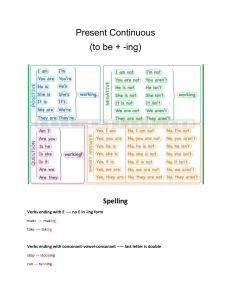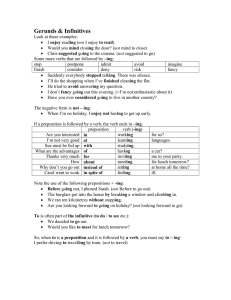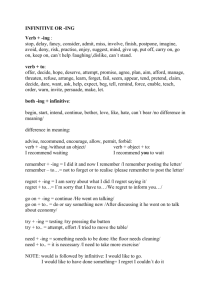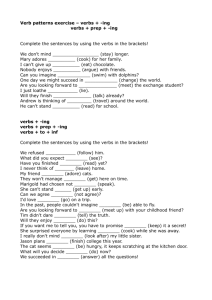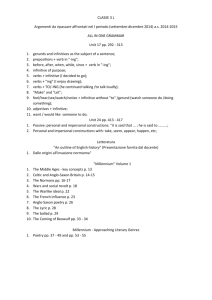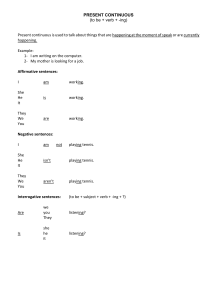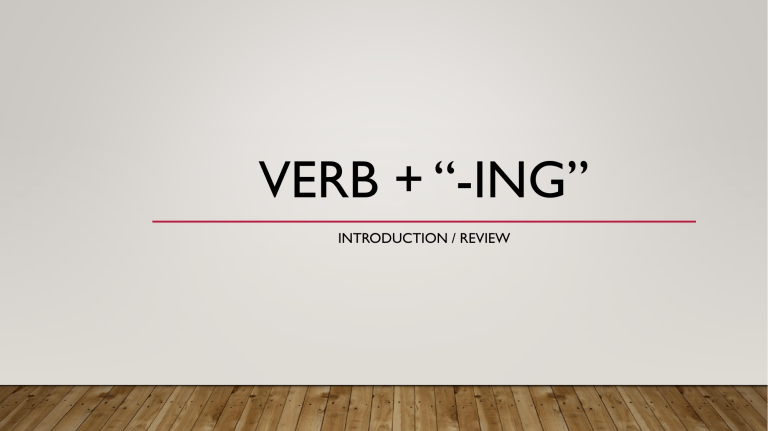
VERB + “-ING” INTRODUCTION / REVIEW USE OF VERB + “-ING” • We use certain verbs + “-ing” at the beginning of a sentence when it’s used as the subject: • Smoking is bad for you • Running is my favorite hobby • We also use verbs + “-ing” after a preposition including “to”, “of”, or “without”: • I look forward to meeting you (where ‘I look forward to’ means ‘I want to meet you’) • My sister is afraid of flying • They left the party without saying goodbye USE OF VERB + “-ING” [CONTINUED] But be careful – you always use ‘to’ before the infinitive! • We always use the following verbs + -”ing”, whatever the tense: • • • • • • • • Admit: I admit to liking the Spice Girls Avoid: He avoided doing homework as much as possible Dislike: Your cat dislikes getting his feet wet Enjoy: They always enjoyed studying together Risk: She risked missing the deadline Miss: We’ll miss cooking together at the weekend when we go to different universities Consider: They considered seeing the new Star Wars movie at the weekend Fancy: Do you fancy trying that new Chinese restaurant? (with a + “ing” form, fancy means ’want to’) USE OF VERB + “-ING” [CONTINUED] • There’s also a negative form of verb + “-ing”.You form the negative using verb + not + verb + “-ing”: • My brother likes not getting up in the morning (With a + “ing” form, like means enjoy) • My grandparents enjoy not working now they’re retired (With a + “-ing” form, enjoy can mean like) • In some cases, you can also use the form verb + somebody + verb + “-ing” • We discussed Harry going to College • I can’t imagine the Queen riding a motorbike EXAMPLES, EXAMPLES, EXAMPLES • Look at these examples: • I enjoy reading. • (not I enjoy to read) • Would you mind closing the door? • (not mind to close) • Chris suggested going to the cinema. • (not suggested to go) • After enjoy, mind, and suggest, we use “-ing” (not to…) EXAMPLES, EXAMPLES, EXAMPLES [CONTINUED] • Some more verbs that are followed by “-ing” • stop • postpone • admit • avoid • imagine • finish • consider • deny • risk • fancy EXAMPLES, EXAMPLES, EXAMPLES [CONTINUED] • Some more examples • Suddenly everybody stopped talking. There was silence. • I’ll do the shopping when I’ve finished cleaning the flat. • He tried to avoid answering my question. • I don’t fancy going out this evening. (= I’m not enthusiastic about it.) • Have you ever considered going to live in another country? • They said they were innocent. They denied doing anything wrong. • The negative form is not “-ing”: • When I’m on holiday, I enjoy not having to get up early. EXAMPLES, EXAMPLES, EXAMPLES [CONTINUED] • We also use “-ing” after: • give up (= stop) • put off (= postpone) • go on or carry on (= continue) • keep or keep on (= do something continuously or repeatedly) • I’ve given up reading newspapers. I think it is a waste of time. • Catherine doesn’t want to retire. She wants to go on working. (or … to carry on working) • You keep interrupting when I’m talking! or You keep on interrupting … EXAMPLES, EXAMPLES, EXAMPLES [CONTINUED] • With some verbs you can use the structure verb + somebody + “-ing”: • I can’t imagine George riding a motorbike. • You can’t stop me doing what I want. • Did you really say that? I don’t remember you saying that. • ’Sorry to keep you waiting so long.’ ‘That’s all right’ • Note the passive form (being done/seen/kept etc.): • I don’t mind being kept waiting. (= I don’t mind people keeping me …) EXAMPLES, EXAMPLES, EXAMPLES [CONTINUED] • When you are talking about finished actions, you can say having done/stolen/said etc. : • They admitted having stolen the money. • But it is not necessary to use having (done).You can also say: • They admitted stealing the money. • I now regret saying (or having said) what I said. • After some of the verbs (especially admit/deny/suggest) you can also use that ... : • They denied that they had stolen the money. (or They denied stealing …) • Chris suggested that we went to the cinema. (or Chris suggested going …) LET’S PRACTICE • Complete the sentence for each situation using “-ing”. 1. What shall we do? / We could go to the zoo. • 2. Do you want to play tennis? / No, not really. • 3. She suggested… You broke the DVD player. / No, I didn’t! • 6. She admitted… Let’s go swimming / Good idea! • 5. He didn’t fancy… You were driving too fast. / You’re right. Sorry! • 4. She suggested… going to the zoo. He denied… Can you wait a few minutes? / Sure, no problem. • They didn’t mind… LET’S PRACTICE [CONTINUED] • Complete each sentence with one of the following verbs (in the correct form): • answer / apply / be / forget / listen / live / lose / make / pay / read / try / use 1. He tried to avoid _____ my question 2. Could you please stop _____ so much noise? 3. I enjoy _____ to music. 4. I considered _____ for the job, but in the end I decided against it. 5. Have you finished _____ the newspaper yet? 6. We need to change our routine. We can’t go on _____ like this. 7. I don’t mind you _____ my phone, but also ask me first. 8. My memory is getting worse. I keep _____ things. 9. I’ve put off _____ this bill so many times. I really must do it today. 10. What a stupid thing to do! Can you imagine anybody _____ so stupid? 11. I’ve given up _____ to lose weight – it’s impossible 12. If you gamble, you risk _____ your money. LET’S PRACTICE [CONTINUED] • Complete the sentences so that they mean the same as the first sentence. 1. I can do what I want and you can’t stop me. • 2. It’s not a good idea to travel during the rush hour. • 3. Shall we postpone _____ until next weekend? Could you turn the music down, please? • 5. It’s better to avoid _____ during the rush hour. Shall we paint the kitchen next weekend instead of this weekend? • 4. You can’t stop me doing what I want. Would you mind _____, please? Please don’t interrupt all the time. • Would you mind _____ all the time? LET’S PRACTICE [CONTINUED] • Use your own ideas to complete these sentences. Use “-ing”. 1. She’s a very interesting person. I always enjoy talking to her. 2. I’m not feeling very well. I don’t fancy _____. 3. I’m afraid there aren’t any chairs. I hope you don’t mind _____. 4. It was a beautiful day, so I suggested _____. 5. It was very funny. I couldn’t stop _____. 6. My car isn’t very reliable. It keeps _____.

